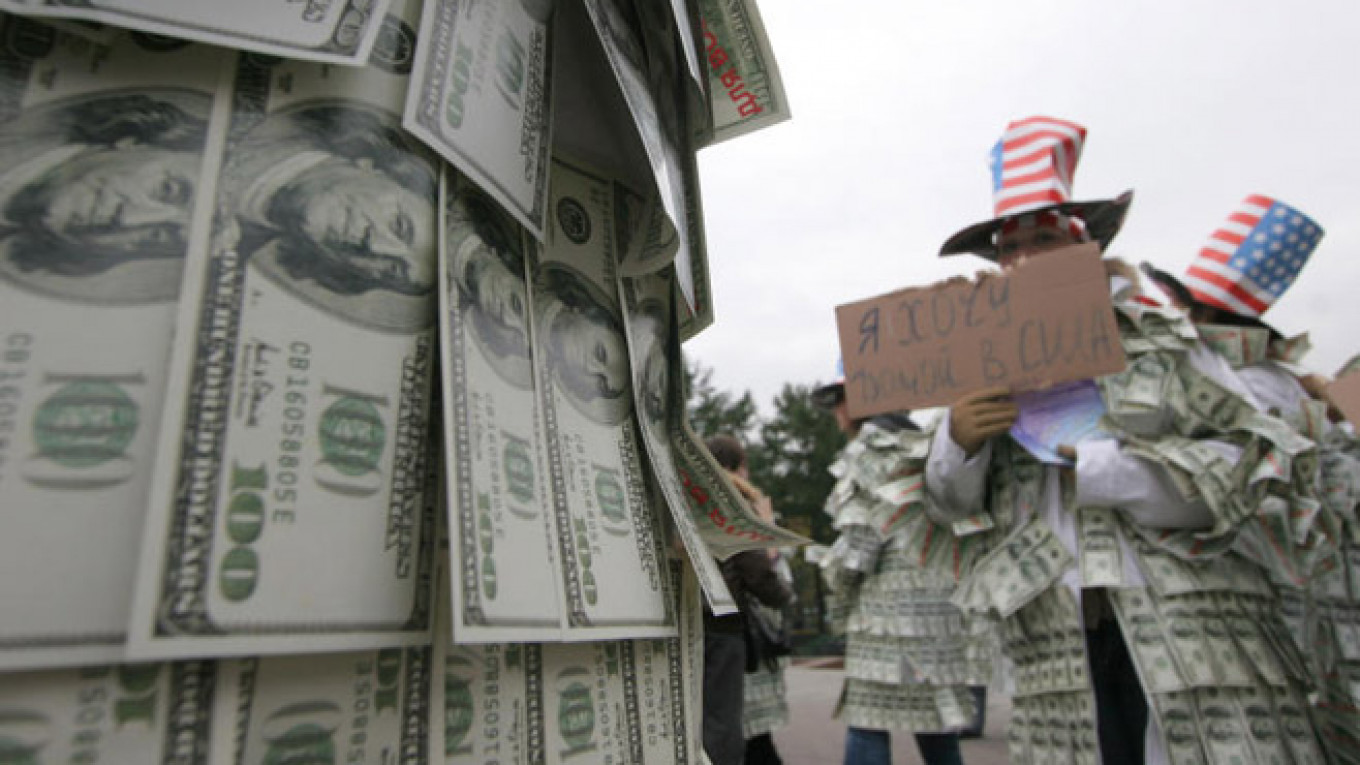The ruble sank to another historic low Wednesday, passing the 41 per U.S. dollar mark twice in morning trading as the Finance Ministry announced it was joining the Central Bank in moves to defend Russia's rapidly weakening currency.
Shortly after midday a dollar was worth 41.04 rubles, the Russian currency's lowest level since being restructured in the 1998 default crisis. It is just a week since the ruble breached the 40 to the dollar mark for the first time.
The ruble also set a new low against the euro, its third in three days, ploughing past 52 to the euro shortly after 5 p.m. in Moscow.
Pressure on the ruble, already battered by tension over Ukraine and Western sanctions on the Kremlin, has intensified since the beginning of the week as the price of crude oil, Russia's key export and the backbone of its state finances, plunged to four-year lows.
"Ruble weakening has become the dominant theme, with the Central Bank the lonely seller," analysts at Sberbank CIB said in a research note Tuesday.
The Central Bank said Wednesday that it had spent $2.72 billion of foreign currency between Friday and Monday, as the total amount of reserves spent buoying the ruble already this month edges toward $10 billion.
The ruble pared losses later in the day, falling to 40.68 against the dollar in the early evening.
One spur for the afternoon correction was a statement by Finance Minister Anton Siluanov, who said Russia would begin foreign exchange deposit auctions within a month.
Siluanov said such a move would slightly reduce pressure on the ruble. A representative of the Central Bank told the Prime economic news agency that the auctions would help meet demand for foreign currency.
The amount of money available to the Finance Ministry for this type of operation was probably around $5.7 billion, according to Dmitry Polevoy, ING Bank's chief economist in Moscow. But he added that while it may slow the ruble's decline, it was unlikely to stop it.
"Given the scale of the market stress, the Finance Ministry deposits alone won't be able to cure the foreign exchange market," Polevoy said in a note to investors Wednesday.
Brent oil fell to a new four-year low of $83.9 per barrel in London on Wednesday. Crude had recorded its biggest one-day fall in three years a day earlier and has plunged over 20 percent since a mid-June high.
"Weak oil is having a direct impact on the national currency, which could lead to fresh historical lows against the dollar," analysts at Promsvyazbank in Moscow said in a note Tuesday.
The Central Bank said Wednesday that it had lifted its proscribed trading corridor for the ruble, which it uses as a guide for market interventions, by 35 kopeks Tuesday. The upward shift was the 11th such move since the beginning of this month.
The Central Bank automatically sells its foreign currency reserves on the market once the ruble overshoots the boundary set for it, shifting the trading corridor by 5 kopeks every time it spends $350 million.
A shift of 35 kopeks indicates that the Central Bank, which releases foreign currency data with a two day time lag, spent about $2 billion Tuesday in efforts to strengthen the currency.
Few experts predict that the ruble will reverse its recent falls in the face of weakening crude prices and the continuing impact of Western sanctions on Russia, which is struggling to avoid a recession after a sharp slowing of growth last year.
While causing pain for importers, ruble devaluation generates extra money for Russian commodity exporters and extra money for the government's coffers through increased tax revenues.
"It is interesting how the Central Bank is not panicking," Timothy Ash, head of emerging market research at Standard Bank, said in a note to investors Wednesday. "They appear comfortable with ruble weakness — seeing this as an escape valve for market concerns and also a likely kicker for growth."
Contact the author at h.amos@imedia.ru
A Message from The Moscow Times:
Dear readers,
We are facing unprecedented challenges. Russia's Prosecutor General's Office has designated The Moscow Times as an "undesirable" organization, criminalizing our work and putting our staff at risk of prosecution. This follows our earlier unjust labeling as a "foreign agent."
These actions are direct attempts to silence independent journalism in Russia. The authorities claim our work "discredits the decisions of the Russian leadership." We see things differently: we strive to provide accurate, unbiased reporting on Russia.
We, the journalists of The Moscow Times, refuse to be silenced. But to continue our work, we need your help.
Your support, no matter how small, makes a world of difference. If you can, please support us monthly starting from just $2. It's quick to set up, and every contribution makes a significant impact.
By supporting The Moscow Times, you're defending open, independent journalism in the face of repression. Thank you for standing with us.
Remind me later.


